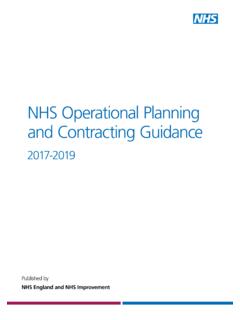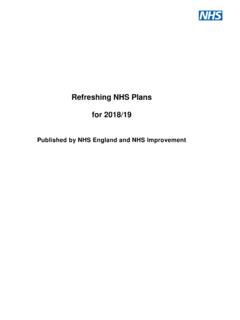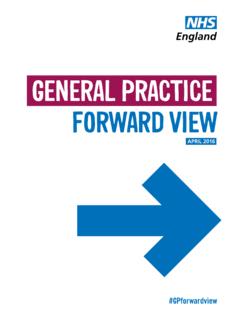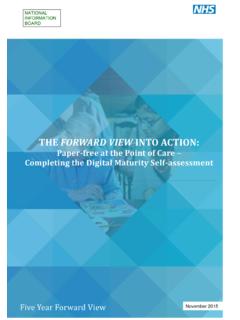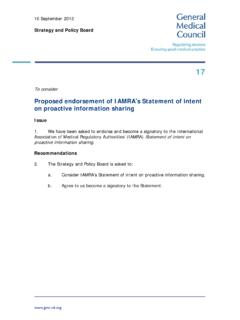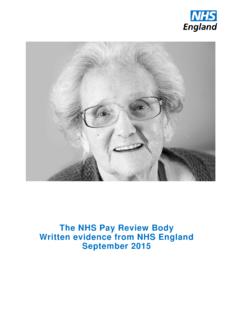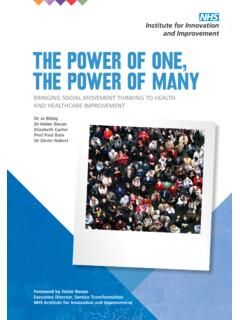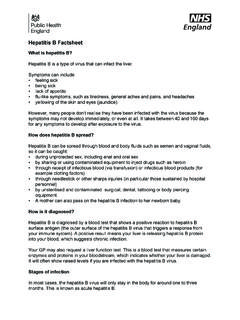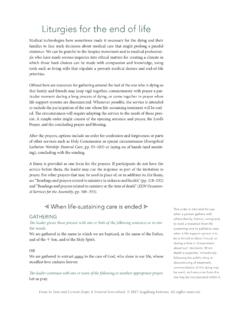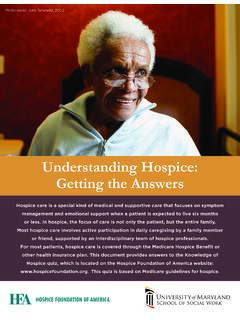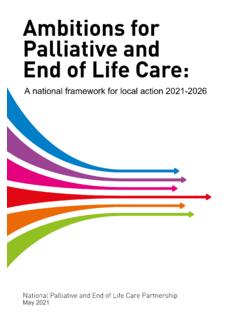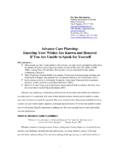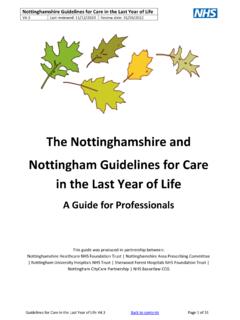Transcription of Advance Care Planning Framework - NHS England
1 Advance Care Planning Framework Table of contents Foreword Acknowledgements Executive Summary, Vision, Background and Recommendations 1. Introduction and overview of Advance Care Planning Framework Project 2. What is ACP? Advance Care Planning What is the difference between Advance Care Planning , Best Interest Decisions and Anticipatory Care Planning ? 3. Aim of this Framework What is this Framework for? Model of Implementation Building Block 1 Engagement Building Block 2 Education Building Block 3 System infrastructure Building Block 4 Continuous Quality Improvement Project summary References Appendices: Appendix A Planning for your future care.
2 A guide leaflet Appendix B Example Record of Discussion Appendix C Example Advance Statement Appendix D Example Advance Decision to Refuse Treatment Appendix E Prognostic Indicator Guidance Appendix F Supportive Palliative Clinical Indicator Tool Glossary of Terms and Acronyms Resources Page 3 4 6 10 10 10 12 14 14 15 15 17 19 21 23 24 27 27 28 29 31 33 33 34 363 Foreword Having the conversation about what treatment and care people want at the end of their lives can be difficult and emotional for families.
3 As a society we tend to shy away from talking about the possibility of death and dying, fearful that having the conversation might actually make it happen. Clinicians doctors, nurses, and allied health staff- can also find these conversations difficult and it is human nature to avoid challenging situations. However, not having these conversations doesn t stop people dying, and avoiding it means that we don t give people the opportunity to tell us what is important to them at the end of their lives. Having the conversation is important, but if we talk about it without making a record of the conversation there is a chance that a persons stated wishes and beliefs might be misinterpreted or forgotten.
4 In recognition of the importance of supporting people to plan for their end of life care, the Cheshire & Merseyside Palliative & End of Life Care Network (PEOLCN) commissioned the Marie Curie Palliative Care Institute Liverpool (MCPCIL) to develop a Framework that will support health and social care staff, through enhanced skills, confidence and resources to incorporate Advance Care Planning conversations in everyday practice. This Framework , which has been developed in collaboration with colleagues across the network, gives clear recommendations on how to make Advance care Planning a reality.
5 The PEOLCN is grateful to MCPCIL for their support and will endeavour to work with commissioning and provider organisations in taking the recommendations forward Dr Paula Powell Clinical Lead Cheshire & Merseyside Palliative and End of Life Care Network Advances in medical treatment mean that most of us will live to an old age, consideration of what, how and where we want medical treatment and care in the future are therefore important considerations. During this time there are likely to be medical crises, often getting more frequent as our condition progresses.
6 During this time we may lose our capacity to speak for ourselves and make our wishes known. Most of us can imagine situations where it is important to consider quality of life rather than just quantity of life. Worries about severe impairment, burdensome treatment and simply prolonging the dying process are almost universal. However, when faced with end of life decisions, even family members who know us intimately may struggle to know our wishes and instead make assumptions about what they think our choices might have been.
7 So, having conversations with those who care about us and care for us, is important. As medical treatment gets more complex, we need more than ever to put the person in the centre of care and that means promoting conversations about Planning for their future care. Professor John Ellershaw Director Marie Curie Palliative Care Institute Liverpool 4 Everybody should have the opportunity for honest, sensitive and well-informed conversations about dying death and bereavement Ambitions for End of Life Care: a national Framework for local action 2015-2020 As a carer and representing patients and carers across Cheshire & Merseyside I fully endorse this statement.
8 The Cheshire & Merseyside Framework for Advance care Planning supports having those sometimes difficult and sensitive conversations and recording them This ensures that if in the future a person cannot make their wishes known, or they become seriously ill and move from one health or social care setting to another, the wishes they have so carefully considered and written for others to see can be shared with all involved in their care. Sharon Bird People s Voice Cheshire & Merseyside Strategic Clinical Networks 5 Acknowledgements This Advance Care Planning Framework for Cheshire & Merseyside Palliative and End of Life Care Network (CMPEoLCN) 2015 has been developed with extensive consultation across the regional health sector, including primary, secondary and tertiary healthcare providers and patient representatives from network Healthwatch organisations.
9 In particular, we acknowledge and thank the members of the Advance Care Planning Project Management Group for their expert advice: Advance CARE Planning PROJECT MANAGEMENT GROUP Dr Clare Littlewood Chair and Project Lead, Marie Curie Palliative Care Institute Liverpool (MCPCIL) Caroline Flynn CMPEoLCN Quality Improvement Lead Maureen Gambles Service Innovation and Improvement Lead, MCPCIL Helen Mulholland Research Assistant, MCPCIL Tamsin McGlinchey Research Assistant, MCPCIL Jo Coulson Education Facilitator, Wirral Annamarie Challinor End of Life Partnership, Cheshire Dr Maria Earle Primary Care Lead Dr Liz O Brien Consultant Palliative Medicine, Warrington Hospital Joanne Meredith Transform Facilitator, Warrington and Halton NHS Foundation Trust Rita Doyle End of Life Care Programme Manager.
10 Royal Liverpool University Hospitals Chris Eccles Community Specialist Palliative Care CNS, Liverpool Angela McComish ACP Facilitator, Liverpool Heart & Chest Hospital Barbara Dilnot ACP Facilitator, Aintree University Hospital Jan Lawton EOL Lead, St Helens & Knowsley Hospitals Jan Cummins ACP Facilitator, St Helens & Knowsley Community Dr Karen Groves Consultant Palliative Medicine, West Lancs, Southport, Formby Maria Kane Quality Improvement Lead, North West Ambulance Service Elaine Allison Nursing home representative Kate Gratwick Healthwatch representative Audrey Meacock Healthwatch representative Sharon Bird Patient / carer representative Melanie Ridpath District Nursing Representative 6 Executive summary Background Our population is ageing and the burden of chronic disease is Those living with chronic disease may have preferences for the kind of care they would want or not want in the event that their disease rendered them temporarily or permanently incapable of
